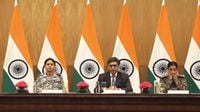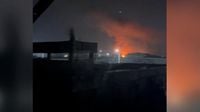The ongoing confrontation between India and Pakistan escalated dramatically on Saturday, May 10, 2025, as Islamabad launched a military operation in retaliation for what it claimed were Indian strikes on its military bases overnight. In response, India’s military stated that it had "effectively countered and responded" to Pakistan’s operation, intensifying a conflict that has deep historical roots and present-day implications.
The heightened tensions were primarily triggered by a recent massacre of tourists in Indian-controlled Kashmir last month, which India cites as justification for its military actions. Following this tragic event, India initiated "Operation Sindoor" on May 7, 2025, targeting what it described as a "terrorist infrastructure" in both Pakistan and Pakistan-administered Kashmir.
As the situation escalated, U.S. Secretary of State Marco Rubio offered mediation to help de-escalate the conflict. Speaking with leaders from both nations, Rubio emphasized the need for direct communication to avoid further miscalculations. His intervention highlights the international community's concern regarding the potential for a broader conflict in the region.
On the ground, Indian forces have been actively engaged in countering threats from Pakistan. Reports indicate that Indian air defense systems successfully shot down multiple Pakistani drones attempting to breach Indian airspace near Amritsar. The Indian military has described its actions as a necessary defense against "unacceptable" aggression, reaffirming its commitment to counter every hostile act.
In a statement, the Indian Army confirmed the destruction of several military posts and a terrorist launchpad, which were believed to be used for planning attacks against Indian civilians and security forces. This coordinated fire assault was a direct response to Pakistan's drone strikes on May 8 and 9, which targeted Indian air bases and civilian infrastructure, leading to civilian casualties.
Foreign Secretary Vikram Misri condemned Pakistan’s actions as "provocative and escalatory" during a press briefing. He criticized Pakistan for its attempts to target air base stations and civil infrastructure, which he claimed resulted in unnecessary civilian suffering. Despite the provocations, he noted that India has taken "measured" actions to minimize collateral damage.
Fresh explosions were reported in Srinagar following the Indian military's strikes, indicating that the conflict is not confined to the borders but is affecting civilian areas. The Barmer District Collector has issued a high red alert, urging residents to stay indoors, reflecting the anxiety gripping the region as military operations continue.
In Chandigarh, a large number of youths responded to a local call for civil defense volunteers, showcasing a surge of nationalism amid rising tensions. Many expressed their readiness to support the military efforts, with one volunteer stating, "...ready to give my life for India. We have filed the form; we are ready to do whatever is expected from us..." This collective response underscores the heightened patriotic sentiment as citizens rally in support of their country.
On the diplomatic front, U.S. Secretary of State Rubio has been in contact with both Indian External Affairs Minister S. Jaishankar and Pakistani Deputy Prime Minister Ishaq Dar, urging both sides to de-escalate tensions. He proposed U.S. support in facilitating productive discussions to address the ongoing crisis.
Meanwhile, Pakistan's defense minister Khawaja Asif denied reports of a meeting of the National Command Authority, which oversees the country’s nuclear arsenal, amidst escalating military activities. This statement came after reports suggested that Pakistani Prime Minister Shahbaz Sharif had called for an emergency meeting of the authority, indicating the seriousness of the situation.
Col. Sofiya Qureshi of the Indian Army highlighted that Pakistan has been using civilian aircraft as cover for its military activities, complicating the situation further. This tactic has forced Indian air defense to act with caution to ensure civilian safety while responding to threats.
As the conflict continues, Foreign Secretary Misri dismissed allegations that Indian missiles had struck Afghanistan, labeling them as "ludicrous" and suggesting that such claims were attempts to deflect attention from Pakistan’s own actions. He pointed out that the Afghan people are well aware of the real perpetrators behind attacks on their civilian populations.
Former diplomat KP Fabian commented on the insecurity of the Pakistani leadership, asserting that it leads to irrational decisions in the face of international scrutiny. The ongoing military engagements and the rhetoric from both sides indicate that the situation remains volatile.
In response to Pakistan's military activities, Indian forces have successfully thwarted numerous attacks, including a high-speed missile aimed at Punjab-based airbases. Reports indicate that Pakistan attempted to target 26 sites in India, but Indian forces managed to counter most of these threats.
The Indian Army's decisive actions have reportedly dealt a significant blow to terrorist operations in the region, as they continue to monitor and respond to threats along the Line of Control. As tensions remain high, the Indian armed forces are on high alert, prepared for any escalation.
As the situation develops, both Indian and Pakistani forces are bracing for further confrontations, with military readiness at an all-time high. The international community watches closely, hoping for a resolution to the conflict that has plagued the region for decades.
In summary, the ongoing military operations and diplomatic efforts reflect a complex interplay of national security, regional stability, and international diplomacy. The coming days will be crucial in determining the trajectory of this conflict, as both nations navigate the precarious balance between military action and diplomatic dialogue.





